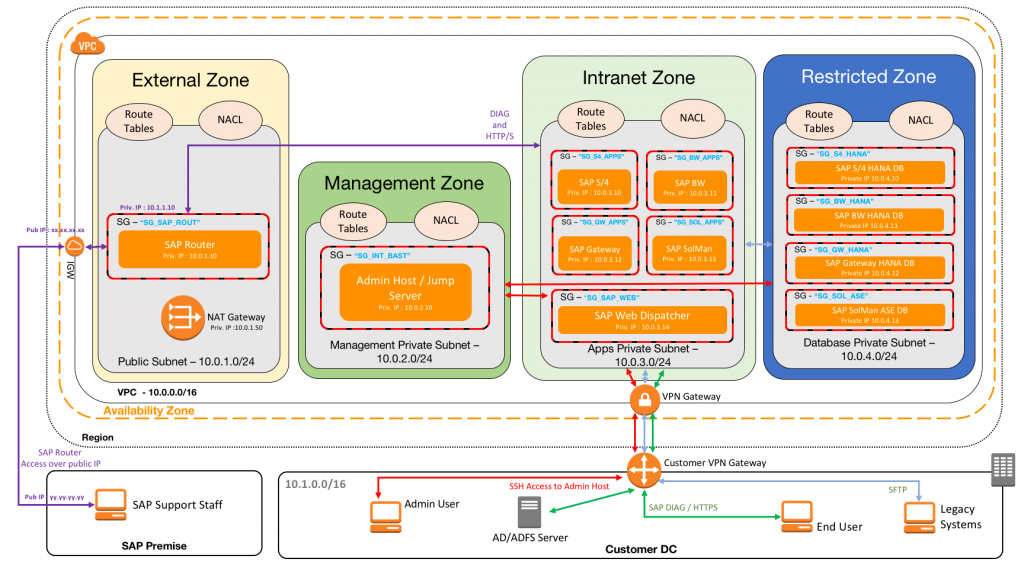AWS for SAP
Tag: Best practices
SAP ASE high availability design with SAP Fault Manager and AWS Network Load Balancer
Introduction: As organizations increasingly prioritize business continuity and minimal downtime, many are assessing their HA configurations to achieve the optimal redundancy and cost-effectiveness for their needs. For SAP ASE databases, the different options available for HA are outlined in SAP note # 1650511 – SYB: High Availability Offerings with SAP Adaptive Server Enterprise (SAP S-User […]
Building Enterprise-Ready Hybrid Network Connectivity on AWS for SAP Cloud ERP Private (formerly known as RISE with SAP)
Introduction Are you ready to unlock the full potential of your SAP workloads on AWS? Let’s solve one of the most crucial pieces of the puzzle: establishing secure, reliable network connectivity between your company networks and your cloud ERP workloads. At AWS, as we’ve helped customers implement their SAP Cloud ERP Private workloads (formerly known […]
Enhance your business process resilience with Amazon CloudWatch Application Insights Observability for SAP High Availability – Part 2
Introduction In the second part of our blog series, we will share more details on each of the key capabilities of Amazon CloudWatch Application Insights, to aid in using the insights gained, to catch trends in your system, understand the overall health of your SAP landscape, and react accordingly, to maximize your business continuity. The […]
Updated Guidance for SAP Pacemaker configuration – ABAP SAP Central Services (ASCS)
SAP customers running critical workloads on Linux on AWS often rely on Pacemaker, an open source resource manager, to orchestrate maximum availability. Pacemaker detects and reacts to failure scenarios that impact SAP uptime by disrupting the underlying infrastructure, the operating system or the SAP application itself. AWS worked with SUSE and Red Hat on the […]
Updated SAP Lens for the Well-Architected Framework now includes the Sustainability Pillar and self-service tool
In 2021, AWS released the SAP Lens for Well-Architected Framework. Today we are pleased to announce Version 2.0 of the SAP Lens for Well-Architected Framework for general use by customers and partners to improve their SAP on AWS workloads with the latest AWS guidance and an added sustainability focus. Over the past year we have […]
Introducing the SAP Lens for the AWS Well-Architected Framework
Introduction SAP applications represent the financial system of record and business process backbone for most of the world’s enterprises. Because SAP workloads are both mission-critical and often resource-intensive, architectural decisions can have large impacts. Understandably, customers want to make sure their architecture supports their unique business and technical requirements. AWS has been supporting SAP workloads […]
SAP on AWS: Build for availability and reliability
In the words of Amazon CEO Andy Jassy ‘there is no compression algorithm for experience’. With over 5000 SAP customers on AWS, AWS has become a platform for innovation for SAP workloads. With our working backwards leadership principle, AWS has built several tools and services to help SAP customers build robust, reliable and scalable SAP […]
Your ERP environment, your choice: RISE with SAP presents another ERP modernization path for AWS customers
Introduction Recently, SAP announced RISE with SAP, a single-tenant, SAP-managed S/4HANA solution that also includes SAP Business Technology Platform and other SAP software in a single contract. This offering delivers a standard production SLA of 99.7% (99.5% non-PROD) on the core RISE with SAP offering (and a 99.9% SLA with a price uplift). Additionally, SAP […]
What we learned from SAP customers at AWS re:Invent 2020
Each year, AWS re:Invent gives us an opportunity to connect with our customers, celebrate their successes, and announce new ways we intend to solve their challenges moving forward. While we couldn’t be together in person this year, we still had an incredible few weeks hearing from SAP customers as they showed us how they are […]
VPC Subnet Zoning Patterns for SAP on AWS, Part 2: Network Zoning
Discusses how traditional application network zoning can be mapped to AWS. This is the second post in the series on VPC subnet zoning patterns.









